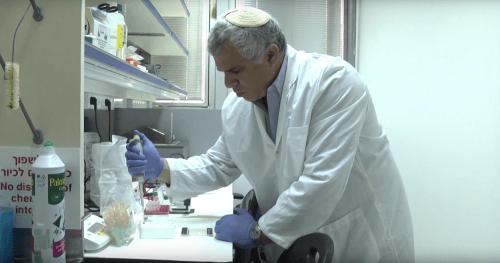"Now our goal is to fully understand the mechanism of the mutation we found in order to bring it to expression, so that we will enable longevity while maintaining their quality," said Prof. Gil Atzmon from the University of Haifa, who heads the research

A mutation was found in the growth hormone receptor gene that contributes to an average longevity of about ten years among men, according to a new study led by Prof. Gil Atzmon from the University of Haifa. "We previously knew that damage to genetic pathways related to growth hormone are also related to longevity and now we have found a specific mutation whose presence or absence is directly related to this," said Prof. Atzmon.
Already in previous studies by Prof. Atzmon, head of the Laboratory for Genetics and Epigenetics of Old Age and Longevity at the University of Haifa, and others, it was found that abnormal functioning of biological pathways related to the growth hormone and the hormone IGF-1 (short for Insulin-like growth factor-1) contribute to longevity . However, so far, the damage to these pathways has been done in the laboratory and no mechanism has been found inside the body that causes this.
In the current study, published in the journal Science Advances, a mutation was found for the first time that impairs the activity of growth hormone and contributes to longevity in men. The initial study population consisted of approximately 102 American Jews over the age of 100 and then the results were compared to three other populations from all over the world of people over the age of 100.
In all those groups, it was found that the mutation, which is expressed in the absence of exon 3 in the growth hormone receptor gene, is significantly more common among men (and not among women) over the age of 100, compared to the 70-year-old control group. On average, people born with the mutation This one lived ten years longer than people without the same mutation. According to Prof. Atzmon, there is no doubt that the mutation is not the only or exclusive cause of longevity, and there were also many among the subjects who lived over 100 without the mutation, but the presence of the mutation almost certainly guaranteed longevity.
From the examination of the activity of the mutation it became clear that the results of its activity are extraordinary. In nature, usually, lower varieties of the same species live longer. This is how ponies live longer than normal horses, small dog species live longer than large ones and this phenomenon is also true among various insects. However, in the present case, the mutation in the receptor meant that although it was possible for the cells to absorb less of the growth hormone, when the hormone was absorbed by the receptor, the expression of the proteins was increased several times. The result: the people born with the mutation who lived about ten years longer were also about three centimeters (inches) taller compared to those born without the receptor.
"The current research firmly closes for us the connection between hormonal growth and longevity. Now our goal is to fully understand the mechanism of the mutation we found in order to bring it to expression, so that we will allow longevity while maintaining their quality", Prof. Atzmon concluded.
See more on the subject on the science website:

2 תגובות
This is the following SNP: rs2802292 ??
interesting